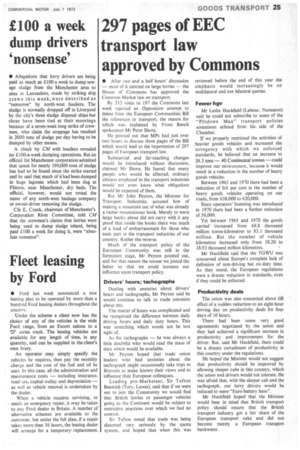297 pages of EEC transport law approved by Commons
Page 27

If you've noticed an error in this article please click here to report it so we can fix it.
• After two and a half hours' discussion — most of it centred on large lorries — the House of Commons has approved the Common Market law on transport.
By 213 votes to 197 the Commons last week rejected an Opposition attempt to delete from the European Communities Bill the references to transport, the reason for which was explained by Front Bench spokesman Mr Peter Shore.
He pointed out that MPs had just over two hours to discuss three pages of the Bill which would lead to the importation of 297 pages of European transport law.
Substantial and far-reaching changes would be introduced without discussion, claimed Mr Shore. He feared that many people who would be affected, ordinary citizens employed in the transport industries would not even know what obligations would be expected of them.
But Mr John Peyton, the Minister for Transport Industries, accused him of making a mountain out of what was already a rather mountainous book. Merely to wave large books about did not carry with it any proof that inside the books there was much of a load of embarrassment for those who took part in the transport industries of our country. Rather the reverse.
Much of the transport policy of the European Community was still in the formation stage, Mr Peyton pointed out, and for that reason the sooner we joined the better so that we could increase our influence upon transport policy.
Drivers' hours; tachographs Dealing with anxieties about drivers' hours and tachographs, Mr Peyton said he would continue to talk to trade unionists about this The matter of hours was complicated and he recognized the difference between daily driving hours and daily duty hours. This was something which would not be lost sight of.
As for tachographs — he was always a little doubtful who would read the mass of data which would be available.
Mr Peyton hoped that trade union leaders who had anxieties about the tachograph might occasionally take trips to Brussels to make known their views and to influence their European colleagues.
Leading pro-Marketeer, Sir Tufton Beamish (Tory, Lewes), said that if we were not to join the Community we would find that British lorries or passenger vehicles going to the Continent would be subject to restrictive practices over which we had no control.
Sir Tufton noted that trade was being distorted very seriously by the quota system, and hoped that when this was reviewed before the end of this year the emphasis would increasingly be on multilateral and not bilateral quotas.
Fewer hgv Mr Leslie Huckfield (Labour, Nuneaton) said he could not subscribe to some of the "Piltclown Man" transport policies sometimes echoed from his. side of the Chamber.
If we properly restricted the activities of heavier goods vehicles and increased the stringency with which we enforced standards, he believed that an increase to 39.3 tons — 40 Continental tonnes—could improve our environment, because it would result in a reduction in the number of heavy goods vehicles.
Between 1965 and 1970 there had been a reduction of 0.6 per cent in the number of heavy goods vehicles operating on our roads, from 638,000 to 620,000.
Since operators' licensing was introduced in 1970 there had been a further reduction of 56,000.
Yet between 1965 and 1970 the goods carried increased from 68.8 thousand million tonne-kilometres to 83.1 thousand million. But the number of vehicle kilometres increased only from 18.20 to 18.93 thousand million kilometres.
Mr Huckfield said that the TGWU was concerned about Europe's complete lack of definition of non-driving but on-duty time. As they stood, the European regulations were a drastic reduction in standards, even if they could be enforced.
Productivity deals
The union was also concerned about tilt effect of a sudden reduction to an eight-hour driving day on productivity deals for four days of 10 hours.
There had been some very good agreements negotiated by the union and they had achieved a significant increase in productivity and improvement for the driver. But, said Mr Huckfield, there could be a drastic curtailment of productivity in this country under the regulations.
He hoped the Minister would not suggest that productivity should be improved by allowing sleeper cabs in this country, which the union and drivers would not tolerate. He was afraid that, with the sleeper cab and the tachograph, our lorry drivers would be reduced to mere "Euro-battery hens".
Mr Huckfield hoped that the Minister would bear in mind that British transport policy should ensure that the British transport industry got a fair share of the European transport cake and did not become merely a European transport backwater.
















































































































































